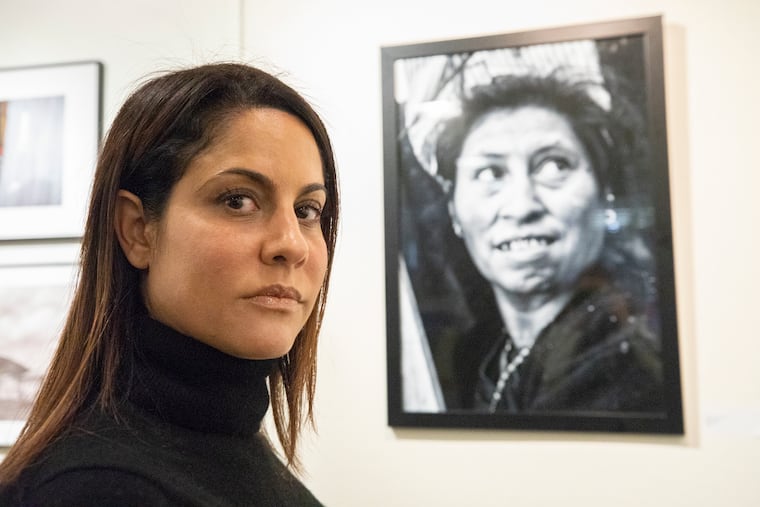As Trump marches on with border demands, a Philly photographer’s view of the migrant caravan stuck in Mexico | Helen Ubiñas
"I wanted the truth."

The timing was coincidental but there was no ignoring the stinging irony. On the day that President Donald Trump delivered his first Oval Office address to try to scare Americans into supporting his border wall, Philadelphia artist Ada Luisa Trillo was at the opening reception of an exhibit where two of her photographs of the migrant caravan in Mexico were on display.
There, at International House Philadelphia, hung one photo, a fleeting moment of levity in black and white where a woman named Estrella – meaning star in Spanish - smiled to show off the decorative stars on her front teeth.
And there, during a rare break from the grueling trek between Honduras and Mexico was Maria Georgina Alemán, her arms wrapped lovingly and protectively around her 12-year-old son. When the gangs came for money she didn’t have, she told Trillo they burned down her small neighborhood store. And then their house. When they came for her son, ripe for recruiting into their brutal band, mother and son fled.
Trillo took thousands of photographs, and listened to countless stories, and not one sounded anything like President’s Trump’s lies of terrorists surreptitiously marching toward the United States.
What Trillo saw instead was young men desperate to work, old men desperate to live out their last days without fear. Mothers and fathers and children — so many children — fleeing crushing despair.
“These are not criminals," she said. "They are people in desperate need of help. These are human beings.”
What Trillo heard while she accompanied them on the more than 2,000-mile trek from Tapachula to Tijuana were stories of unimaginable hardship, and pleas for help, mostly for sick children who had little chance of quality health care, or even survival, in their countries:
Like Javier Antonia, 15, with Down’s syndrome, a heart condition, and a dwindling supply of medication, and not even the right kind, from the local Red Cross.
And Izzy, a little girl of about 6 or 7 in a wheelchair with cerebral palsy, traveling with her father, a young man who refused to abandon his daughter, although her own mother did.
Trillo, who is 42 and has two teenage daughters, has lived in Center City for 18 years. She was born in El Paso, Texas, but her family is from Mexico and still lives there. She set out to meet the caravan at the end of October, after a man she had met on another immigration story told her he was joining them in another attempt to get to the United States. He sent her a picture as they neared Tapachula, in Mexico’s southwest corner.
She bought a ticket, grabbed her cameras, and left.
“I wanted the truth.”
The migrants knew they were unwanted and unwelcome, but faith that their righteous journey would work out kept them going. At night, after most were too tired to speak, someone would call out to everyone to raise their arms up to pray. Their prayer? That Trump would have a change of heart.
They were still alive, the person leading the prayer one night said. They still had food and water, however limited. Together, they were still safe.
“So that means there is still a God,” Trillo recalled one of the prayer leaders saying.
And so, they would walk on, carrying little more than the clothes on their backs. And when they could no longer take another step, they’d sleep where they fell. Sometimes there were shelters along their journey. When there weren’t, they covered themselves in black plastic bags, or used them to fashion tents. When there was no food or water, they’d divide a bottle of water among several plastic baggies so the parched could at least wet their lips. Mothers, dehydrated, ran out of breast milk.
Trillo started a GoFundMe campaign to help. She was happy to raise about $1,000, but she knew that wasn’t enough.
Even before she ended her month-long trip at the Tijuana border around Thanksgiving, she could feel the hope waning as the caravan waited for nothing less than a miracle at the border.
Back home in Center City, she looks through her photographs, vivid portraits of determination, of dignity in the face of fear, their own fears and those being stoked to portray them as enemies.
Some of the people have already turned back. But many more haven’t. They can’t. They believe they have nothing to turn back to except certain death.
That is what she wished Trump saw when he headed to Texas this week to meet with border agents who are working without pay because of the government shutdown over the political border showdown. If he had spent some time with Maria or Javier or little Izzy, maybe...
Maybe, as so many of the refugees pray, the president of a country truly made great by opening its arms to those in need would have a change of heart instead of saying he would “almost definitely” declare a national emergency to have his border wall.